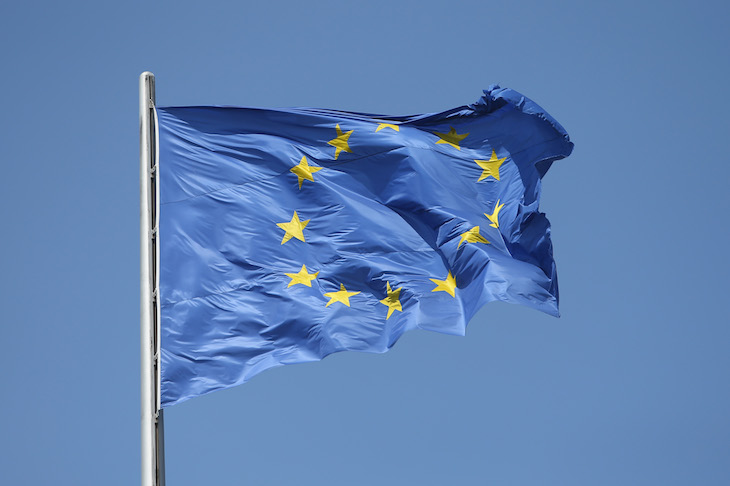I’m proud to be a member of the 661-year-old Company of Merchant Adventurers of the City of York, having qualified on the strength of a first career spent trying to sell British financial services around the globe from Hokkaido to Gdansk. Before our annual feast last week we prayed optimistically for the discovery of ‘a better world’ from which we might bring back treasure, spiritual and material — and I couldn’t help thinking that UK trade prospects are a lot less straightforward today than they were in 1357, when the known world was eager to buy woollen cloth from English mercers as often as their little ships could cross the choppy North Sea. It was at another dinner with policy boffins and business folk a few days earlier that I was reminded just how little we should realistically expect after Brexit by way of help from Europe, America and the rest of the world.
The gist of it was this. Brussels is good at only one thing, which is the expansion of its regulatory dominion. To imagine its leaders might bend to allow the UK partial market access without full compliance, as a kind of farewell gift, was always delusional — and the lack of clarity in UK negotiating positions so far, driven by discord within Theresa May’s cabinet, makes it all the easier for Michel Barnier to stand his ground until time runs out. As for the Irish border problem — there is no solution, however much fudge is applied, since neither side will accept manned or even camera-monitored customs posts and the UK cannot contemplate a special status for Northern Ireland that effectively leaves it in the EU.
Meanwhile, Donald Trump is obsessed with the enormity of America’s trade deficit with China, which amounted to $375 billion in 2017. That’s seven times the total of all US imports from the UK, which happen to be roughly in balance with total US exports to the UK. In other words, US-UK trade is neither a problem nor a blessing but an insignificant factor in White House thinking and unlikely to win attention or favour any time soon. As for the rest of the world, yes, there might eventually be deals that justify the existence of Liam Fox’s Department of International Trade. But don’t hold your breath or expect them to pay your pension.
Imagine the other side
Gloomy stuff, I know. But at both these gatherings there were other, more positive strands of conversation: about the fact that the internet makes it easier than ever before for small-to-medium manufacturers to export; about the opportunities for UK entrepreneurs in the next wave of technology, including artificial intelligence, and in the service sectors in which we excel; and about the need and the opportunity to present ourselves as a nation that the rest of the world wants to emulate, buy from, visit and invest in. Despite politicians’ idiocies, there’s treasure to be brought home: we just have to imagine what’s on the other side of the choppy seas that currently confront us.
Roberto Who?
I said last week that WPP chief executive Sir Martin Sorrell was in ‘a very exposed position’. Sure enough on Saturday he resigned from the global advertising giant he created and had run for more than 32 years. ‘But he didn’t “create” it,’ one ex-employee told me, illustrating the internal resentments that seem to have contributed to Sorrell’s downfall. ‘He just made a lot of acquisitions and counted the pennies.’ Whatever he did or didn’t do, his departure was undignified and ill-explained. After he’d gone, WPP’s board announced that its investigation into an allegation of financial misconduct against him had concluded, but ‘did not involve amounts that are material’ and would not be mentioned again. That left the world thinking that the resignation swiftly rebadged as ‘retirement’ was really about WPP’s falling share price, driven by sentiment that the top man’s time was up.
Pundits are now asking whether WPP’s conglomerate model from the 1980s can survive without Sorrell in a fragmented new world of advertising that’s obsessed with the sorcery of social media and ‘big data’.
The answer is that it probably can’t and that the famous agency names within WPP will likely find new lives and new alliances. Meanwhile, we’ve been reminded that even in a company whose fortunes have for so long been synonymous with those of its founder, ultimate power resides with the board (a model of correctness, as it turns out, with three female non-execs and many nationalities) and the chairman.
The latter, three years in post, is Roberto Quarta, a seasoned but low-profile boardroom operator of Italian-American origins who was once a protégé of Owen Green, the famously tough chief of the BTR manufacturing conglomerate. On his way up, I gather, Quarta gained a reputation as a ruthless wielder of the corporate knife. In an interview long ago, when he was running an industrial group called BBA, he described his approach: ‘As well as identifying people who can help you push forward change, you’re also trying to remove those who are so entrenched in the old culture that they’re not going to change.’ If the full truth of Sorrell’s departure ever emerges, perhaps we’ll learn that he met his match in Roberto.
Where’s the feelgood?
Toys ’R’ Us, Carpetright, Maplin electronics, New Look fashions, MultiYork sofas, even the Bargain Booze chain you might think would resist any economic shift short of an earthquake… after a long winter, March’s bitter weather reduced shoppers’ footfall by 6 per cent compared to the same month last year, and (says Visa) even online sales fell by 1.2 per cent; now April brings revalued business-rate bills that will knock out another swath of struggling stores. Wage rises have just crept above inflation for the first time in a year, and there’s a distinct absence of feelgood factor. Or is there? If you see short-term reasons to be cheerful, tell me: martin@spectator.co.uk.
Got something to add? Join the discussion and comment below.
Get 10 issues for just $10
Subscribe to The Spectator Australia today for the next 10 magazine issues, plus full online access, for just $10.
You might disagree with half of it, but you’ll enjoy reading all of it. Try your first month for free, then just $2 a week for the remainder of your first year.















Comments
Don't miss out
Join the conversation with other Spectator Australia readers. Subscribe to leave a comment.
SUBSCRIBEAlready a subscriber? Log in